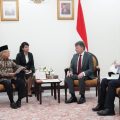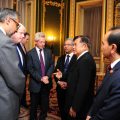BALI, 23 FEBRUARY 2017
Excellencies,
Distinguished participants,
Ladies and Gentlemen,
[Opening]
- I would like to thank the Economist, for organizing this important event.
- I am honored to be here to share with you Indonesia’s perspective on achieving sustainable use of oceans and on blue economy.
[Global challenges on oceans]
- Oceans cover more than seventh ten of our planet. It contains 97 percent of all water on the Earth’s surface.
- Ocean are indeed important for our lives because, among others, they:
- create and give impact to weather around the globe and produces many of life’s essentials, including water, food, and even the oxygen we breathe every day.
- provide natural resources such as food, materials, substances, and energy.
- essential for international trade, recreational and cultural activities.
- However, the extraordinary surge of economic and industrial activities have led to unprecedented changes in oceans ecosystems.
- Climate change has also brought detrimental impacts to the livelihood of the ocean, causing acidification of marine environments, carbon dioxide emissions, nutrient, chemical and plastics pollution; as well as overfishing and the spread of invasive species have been a driver of the damage.
- This combination of factors often exacerbates the impacts of other human pressures on the seas, leading to loss of marine biodiversity.
- Since many human livelihoods depend on marine biodiversity and ecosystems, we cannot let this situation last or even worsened. The international community can no longer neglect the importance of sustainable oceans if we want to achieve sustainable development.
- Business as usual is clearly not an option.
- We need a strengthened international cooperation to protect the marine environment and to ensure sustainable use of marine resources.
- While reiterating the importance of intensifying cooperation and partnership to achieve sustainable and equitable development at all levels, we are also of the view that it is imperative for us to ensure the preservation of the rule of law and good governance principles in the context of ocean governance. Ensuring successful implementation of blue economy and achieving sustainable development are not possible without sound maritime security, sustainable marine environment
- In this regard, I am happy to share that Indonesia warmly welcome the initiative to early implementation of SDG 14 on sustainable oceans and calls for strengthened global partnerships at all levels to achieve the goal. We fervently believe that global partnerships, among others through new and innovative financing mechanisms as well as increased public-private collaboration are key towards fully and timely implementation of the SDGs.
[Challenges faced by Indonesia]
Excellencies,
Ladies and Gentlemen,
- Waters surrounding Indonesia’s archipelago are prone to such irresponsible as well as unsustainable activities, mostly economic-driven ones.
- One of the most pressing problems for Indonesia is illegal, unregulated and unreported fishing (IUU Fishing).
- The Government of Indonesia has been undertaking measures, including law enforcement, to fight the IUUF in our oceans. Indonesia also supports the global efforts to linkage between Illegal, Unregulated and Unreported Fishing (IUUF) with the Trans-National Organized Crime (TOC).
[Indonesia’s efforts to achieve sustainable use of oceans]
Distinguished participants,
- Emphasizing the importance of the vast seas within Indonesia and our strategic geographic position across the Indian and Pacific oceans, President Joko Widodo has articulated a new maritime vision for Indonesia.
- The vision, that emphasizes a balance between economic growth and sustainability, has five elements namely: maritime security, maritime diplomacy, maritime connectivity, maritime culture, and enhancing maritime resources.
- To achieve such vision, the Government has:
- enacted several legislations to provide legal basis to achieve sustainable ocean, seas, and marine resources.
- strengthened the institutional framework to better govern national maritime affairs by establishing a Coordinating Ministry of Maritime Affairs and a Maritime Security Agency.
- enacted Presidential Instruction to accelerate national fishery industry development which serves as a roadmap and putting fishery industrial zones as one of strategic national projects.
[Indonesia’s view on blue economy]
Excellencies,
- Maritime sectors contribute to 20% of our GDP and to 11,38% absorption of national labor force.
- But potentials of Indonesia’s waters are indeed still huge. We are yet to capitalize those potentials and this is why the blue economy concept is being promoted.
- The utilization of oceans and marine resources for faster economic development must be balanced with more intensive programmes for the preservation of the oceanic ecosystem.
- For Indonesia, Blue Economy consists of three mutually reinforcing facets, which are:
- Benefitting from the incredible revenue-generating potential of marine economic activities.
- Ensuring conservation and protection of ocean ecosystems for secure and sustainable development.
- Appreciating the unique social and cultural characteristics of communities connected to the sea.
- Indonesia is now developing a number of pilot projects of blue economy in our Indian Ocean coasts, among others, the Lombok Blue Economy Implementation Program in collaboration with the FAO, which is expected to create 77,700 new jobs and to generate income of Rp 1.3 trillion (US$114.88 million) per year.
[Closing]
Excellencies,
Ladies and Gentlemen,
- In line with our view on the centrality of rule of law and good governance as important pillars for the achievement of sustainable development allow me to share Indonesia’s view on the importance of ensuring stability in the region, including safe and sound maritime security regional stability in the South China Sea.
- History tells that there is no economic success without stability and that there is no stability without peace.
- In this regard, our ability to maintain peace in the region, including in South China Sea is very strategic. The sea connects worlds’ most important economic engines, including ASEAN, Japan, China, and South Korea. It enables the flow of around 40% of world international trade, amounting to beyond USD 5 trillion annually.
- Unfortunately, South China Sea has become a major regional flashpoint.
- Eventhough Indonesia is not a claimant state, we fully believes that mutual respect as well as self-restrain is key to our effort in maintaining peace and security in South China Sea.
- Therefore, all parties need to exercise peaceful resolution through political and diplomatic processes. I would like to reiterate the call to every country to respect the principle of international law, including UNCLOS 1982.
- We understand that resolving territorial disputes are never easy.
- It is indeed timely to transform potential conflicts into opportunities for concrete cooperation.
Ladies and Gentlemen,
- Let me conclude by reiterating that sustainably managing our uses of the ocean is indeed vital. Sustainable management of oceans will help shape our future. Not only the future of the ocean and its biodiversity, but also the ability of the ocean to provide the services that are vital to each of us and to human well-being overall.
Thank you.






